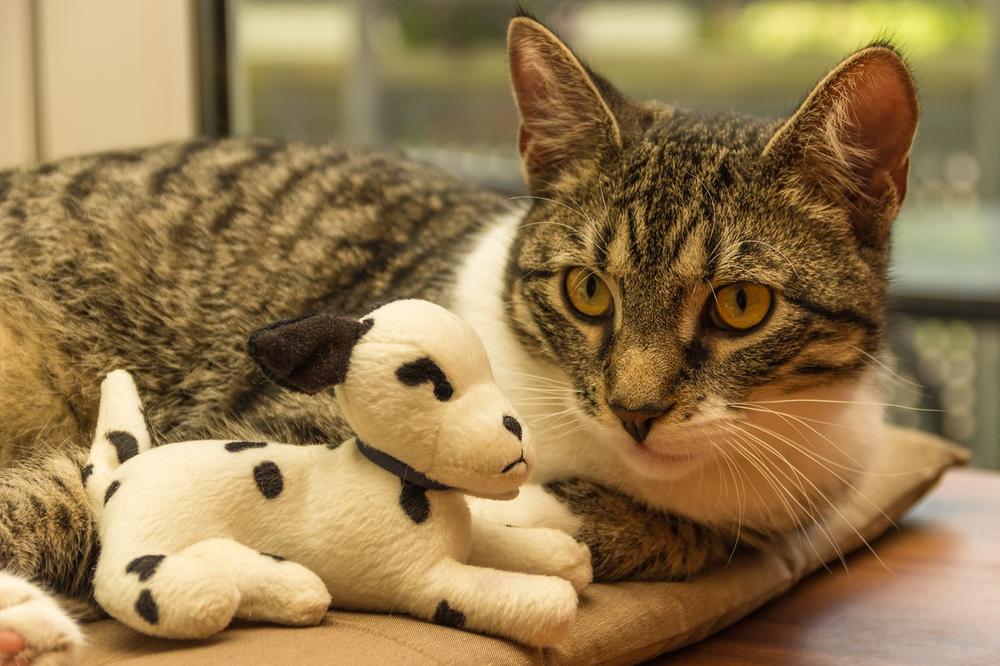Picture this: you’re relaxing at home, enjoying a quiet afternoon, when you hear a strange scratching noise coming from the living room. You investigate and find your beloved cat, paws furiously digging into the carpet, creating a mini-excavation site. This is a scenario familiar to many cat owners, leaving them wondering, “Why is my cat digging the floor?” It’s a frustrating sight, but understanding the reasons behind this behavior can help you address it effectively.

Image: catschef.com
I’ve experienced this first-hand with my own cat, Luna. She loves to dig at my rug, especially after mealtimes and when I’m busy working. It’s something I’ve learned to deal with, but I’m always curious as to why she does it. This article will explore the common causes of floor digging in cats, offer tips to manage it, and provide insights into this intriguing feline behavior.
Unveiling the Reasons Behind Your Cat’s Floor-Digging Frenzy
Cats are natural diggers, a behavior rooted in their wild ancestry. Their instincts drive them to excavate, whether it’s for hunting prey, burying waste, or creating a comfortable nest. However, in a domesticated setting, this innate urge often manifests as floor-digging, which, while amusing to observe, can be a source of frustration for cat owners.
Understanding the Root Causes
There are several reasons why your cat might be digging at the floor:
- Instinctual Behavior: As mentioned earlier, digging is a deeply ingrained behavior in cats, often stemming from their wild ancestors. It’s a natural instinct that allows them to bury waste, create cozy dens, and even hunt for prey.
- Hunting Instincts: Cats are natural hunters, and the act of digging can mimic the behavior of hunting prey. The scratching and digging might trigger a primal instinct to unearth hidden treasures, even if there’s nothing to find in your living room.
- Boredom and Frustration: When cats lack sufficient stimulation, boredom can lead to destructive behaviors, including excessive digging. Cats need plenty of interactive play and enrichment to keep them mentally and physically stimulated.
- Stress and Anxiety: A stressed or anxious cat might dig as a way to release pent-up energy and tension. Changes in the environment, such as the arrival of a new pet or a major move, can trigger stress and lead to increased digging behavior.
- Medical Conditions: While less common, underlying medical conditions like hyperthyroidism or pain can sometimes cause increased digging, especially if it’s accompanied by other unusual behaviors.
Recognizing Different Digging Styles
It’s important to note that the way your cat digs can be a clue to the underlying reason. For example, if your cat is digging near their litter box, it might be due to dissatisfaction with the litter itself, or it might be that the box is too small.

Image: icareforcats.com
Tackling Floor-Digging Behavior
The best approach to dealing with floor-digging is to address the underlying cause. This might involve:
- Providing Adequate Enrichment: Give your cat plenty of interactive toys, climbing structures, and scratching posts. This will provide them with physical and mental stimulation, reducing the urge to dig out of boredom.
- Managing Stress and Anxiety: Identify stressors in your cat’s environment and work to minimize them. This could include providing a safe space, using pheromone diffusers to create a calming atmosphere, or seeking professional help from a veterinarian or certified cat behaviorist.
- Redirecting Behavior: If your cat is digging in a particular spot, try providing a designated digging area with a cat-friendly substrate, such as a shallow box filled with sand or dirt. This will give them a safe outlet for their digging instincts.
- Litter Box Evaluation: If your cat is digging near their litter box, ensure it’s clean, spacious, and has a litter that they enjoy. Consider using a different type of litter or adjusting the frequency of litter box cleaning.
- Consulting a Veterinarian: If you suspect an underlying medical condition is causing your cat’s digging, it’s important to rule out any medical issues by consulting a veterinarian.
Expert Tips for Feline Floor-Diggers
Here are some additional tips for dealing with feline floor-digging:
- Cover up digging spots: For a temporary solution, you can try covering the areas your cat digs with furniture or mats. This will make the area less accessible and may discourage them from digging there.
- Use deterrent sprays: Certain deterrent sprays with citrus or other natural scents can be used to discourage digging in specific areas, but use these cautiously as some cats may dislike the smell.
- Provide a scratching post: Make sure your cat has access to a sturdy scratching post. This will help redirect their scratching instinct, especially if they’re digging because of a need to scratch.
- Make playtime more enticing: If your cat is bored, engage them in energetic play sessions using interactive toys.
FAQs about Cat Floor Digging
Here are some frequently asked questions about cat floor digging, answered concisely:
Q: Why does my cat dig in the corner of the room?
A: This could be a sign of territory marking or a need for a secluded space. Providing a scratching post or catnip toy in that corner might redirect their behavior.
Q: My cat only digs at night. Why?
A: Some cats are more active at night due to their crepuscular nature. If they’re digging at night, it could be due to boredom or lack of attention during the day.
Q: How do I stop my cat from digging up my carpet?
A: Try using a carpet protector, scratching post, or redirecting their behavior with a digging box filled with cat-friendly substrate.
Q: My cat digs at the doormat. Could it be a sign of anxiety?
A: It’s possible. Cats may dig at doormats as a way to release pent-up energy or frustration. Consider providing more enrichment activities and ensuring a calm environment.
Why Is My Cat Digging The Floor
Conclusion
Floor digging in cats is a common behavior, often driven by instinct, boredom, stress, or even medical conditions. By understanding the reasons behind it, you can work to address the problem and create a harmonious home environment for both you and your feline friend. If you’re still struggling to understand the root of your cat’s digging behavior, it’s always best to consult a veterinarian or a certified cat behaviorist for personalized advice.
Are you curious to learn more about cat behavior, or do you have other questions about your own cat’s antics? Share your thoughts in the comments below!






